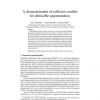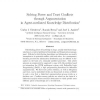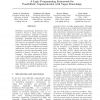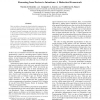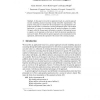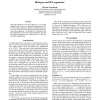140
click to vote
COMMA
2010
14 years 9 months ago
2010
In this paper we define a recursive semantics for warrant in a general defeasible argumentation framework by formalizing a notion of collective (non-binary) conflict among argumen...
112
click to vote
CORR
2004
Springer
15 years 2 months ago
2004
Springer
The field of machine learning (ML) is concerned with the question of how to construct algorithms that automatically improve with experience. In recent years many successful ML app...
125
click to vote
KES
2006
Springer
15 years 2 months ago
2006
Springer
Distributing pieces of knowledge in large, usually distributed organizations is a central problem in Knowledge and Organization management. Policies for distributing knowledge and...
110
click to vote
UAI
2004
15 years 3 months ago
2004
Defeasible argumentation frameworks have evolved to become a sound setting to formalize commonsense, qualitative reasoning from incomplete and potentially inconsistent knowledge. ...
114
click to vote
AAAI
2007
15 years 4 months ago
2007
Here, we define a framework where defeasible argumentation is used for reasoning about beliefs, desires and intentions. A dialectical filtering process is introduced to obtain a...
127
click to vote
DEXA
2006
Springer
15 years 5 months ago
2006
Springer
In this paper we describe an application based on a general approach towards modelling practical reasoning through defeasible argumentation. The purpose of the paper is to show how...
134
click to vote
NMR
2004
Springer
15 years 7 months ago
2004
Springer
The development of Logic Programming and Defeasible Argumentation lead to Defeasible Logic Programming. Its core resides in the characterization of the warrant procedure. Defeasib...
163
click to vote
NMR
2004
Springer
15 years 7 months ago
2004
Springer
Recommender systems have evolved in the last years as specialized tools to assist users in a plethora of computermediated tasks by providing guidelines or hints. Most recommender ...
110
click to vote
NMR
2004
Springer
15 years 7 months ago
2004
Springer
This paper introduces a new class called hang yourself (HY) arguments into the theory of defeasible argumentation. The novelty of such arguments is that they are inherently destru...
124
click to vote
ATAL
2007
Springer
15 years 8 months ago
2007
Springer
In this work, we introduce a framework where defeasible argumentation is used for reasoning about beliefs, desires and intentions. A dialectical filtering process is introduced i...
